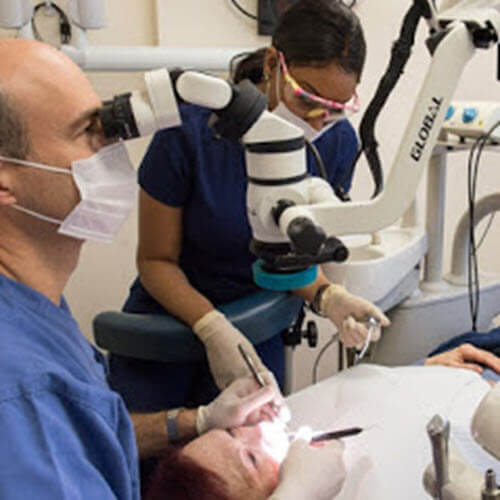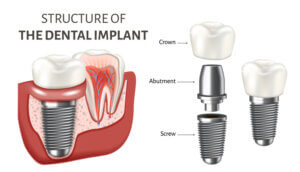Many New York City residents who are missing teeth look to dental implants to give them back their lost oral function and the smile that they love. Dental implants work by inserting a titanium rod into the jawbone, which acts as a tooth root, then placing a tooth-looking crown over the rod to give the normal, aesthetic appearance of a natural tooth. For dental implants to be successful, the titanium rods must fuse with the jawbone to create a tight bond. This happens in most dental implant cases. In fact, dental implants have a 90%–95% success rate. Unfortunately, though, there are rare instances when a dental implant does not fuse with the jawbone – at least not on the first try. While cases of failed dental implants are rare, they do happen, and the chance for failure is something that every candidate for dental implants should be aware of. Read on to learn why dental implants fail and discover what can be done to your mouth to prepare them for a second set of dental implants that will fuse with the jawbone.
Reasons That a Dental Implant Does Not Fuse to the Jawbone
Sometimes dental implants fail (do not fuse to the bone), and they become loose and fall out, or need to be removed. This can happen for a variety of reasons, including:
- Trauma to the tooth implant site, which could have occurred during surgery or after surgery, such as a sporting or car accident;
- Developing an infection around the implant;
- Smoking after the surgery, as smoking, decreases blood flow; and
- Lack of healthy jawbone.
If your dental implant does not fuse properly to your jawbone, you’ll need to be evaluated by an experienced periodontist and dental implant specialist like New York City’s Dr. Kissel. He will determine why the implant failed and will come up with a treatment plan for replacing your failed implant.
How Can You Increase Your Chances of Dental Implants Fusing with the Jawbone?
Just because you experienced teeth implant failure once, doesn’t mean you’ll experience it after a subsequent surgery. In fact, many people who experience implant failure go on to have a successful, subsequent surgery once they address the problem that initially caused the implant failure, to begin with.
If your implant failed due to surgical trauma, such as by seeing a less experienced dental practitioner for your teeth implant surgery, then seeing an experienced professional like Dr. Kissel can help prevent that type of trauma from occurring a second time. If you developed an infection around your implant site, then taking precautionary antibiotics can help prevent a secondary infection from developing during your healing process. And if you smoked after your teeth implant surgery, then quitting smoking can help make your second surgery successful. If however, it is found that you don’t have sufficient jawbone for fusing to occur, then additional surgeries such as bone grafting and/or a sinus lift may be necessary for dental implants to be a viable option for you.
Learning More About Dental Implants
There are so many different things to learn about dental implants, that it’s impossible to discover everything you should know by reading online alone. The best way to learn about dental implants is to speak with an experienced periodontist like Dr. Kissel yourself.
There is a number of considerations for determining whether or not you are a candidate for dental implants and, if so, what type of dental implants are right for you. If you are New York City resident, you can reclaim your beautiful smile and the full functionality of your teeth by booking your dental implant consultation with Dr. Kissel. During a consultation, he will perform a complete oral examination and explain the dental implant procedure to you, including tooth removal (if needed) and dental implant placement to ensure minimal trauma to the surgical site. Schedule your consultation today at his Manhattan periodontal office between E 52nd St. and E 53rd St.

